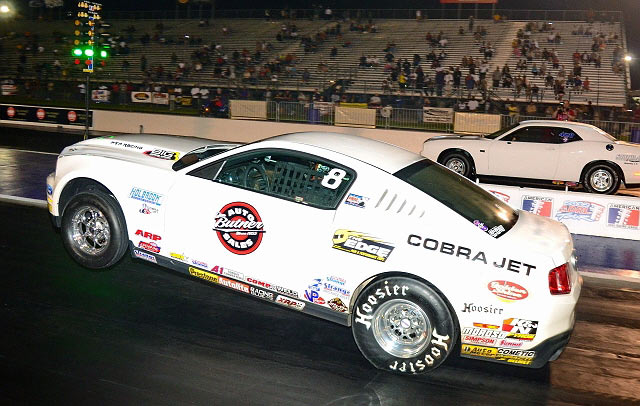EXTRA!
ZERO TO 60 MPH IN 1.52 SECONDS IN A PRODUCTION CAR? BUTNER’S MUSTANG DOES IT IN THE ADRL SUPERCAR SHOWDOWN!

The current global horsepower war among production auto manufacturers has led to amazing achievements in acceleration and carmakers rely on often stunning “0-to-60 mph” times to promote their latest offerings. It appears, however, the Ford Motor Company may have produced the quickest-accelerating production vehicle of all time and the numbers gleaned from the debut of American Drag Racing League’s SuperCar Showdown division seem to prove it.
Although several production cars have proven capable of 0-to-60 times under three seconds, the 2012 Bugatti Veyron Super Sport is generally acknowledged to be the quickest in attaining that goal after verified tests prove it can hit sixty mph in a mere 2.57 seconds. Equipped with an eight-liter, sixteen-cylinder engine with four turbochargers which produces 1,180 horsepower, the 4,162-pound All-Wheel-Drive Veyron carries a list price of $2.4 million dollars.
Bo Butner can now dispute the Bugatti’s record. In fact, he downright destroyed it with his new Ford Mustang Cobra Jet during the ADRL’s season-opening CarSafe Automotive Repair Protection Dragpalooza VIII held at Royal Purple Raceway in Baytown, Texas. Incredibly, Butner was unaware of the Mustang’s 0-to-60 capabilities since he seldom concerns himself with those statistics.
“As drag racers, we look for different numbers to tell us how the car is performing”, said Butner after claiming the first SuperCar Showdown title. “We’re much more concerned with the car’s first sixty feet of travel and we always use elapsed time, rather than speed, as the reference. The only actual speed reading we’re concerned about comes at the finish line and, even then, we’re more concerned about the elapsed time”.
Officials from the ADRL were granted access to the onboard telemetry of Butner’s event-winning Cobra Jet and found the Ford was unknowingly shattering records almost every time it ran down the dragstrip. On his best eighth-mile run at the fabled Texas strip, the past World Champion launched from a standstill and hit sixty miles per hour in a mere 1.52 seconds!
“I’m truly stunned!”, exclaimed the Hoosier state campaigner as he discovered the results embedded in the acceleration graphs displayed from the readout of the onboard data. “I had no idea these cars were reaching these speeds so quickly. We honestly didn’t realize we had the quickest zero-to-sixty production car on the planet!”.
Although open to all production vehicles, the ADRL’s SuperCar Showdown requires strict adherence to factory equipment and modifications are not permitted. Butner’s Mustang utilized the production 5.4-liter, (330 cubic inch), V8 engine equipped with a 2.4-liter supercharger, a production automatic transmission and a factory-produced chassis. The Ford weighed in a 3,550 pounds was also required to compete on drive tires no wider than nine inches, (228 mm).
During the event, Butner also clocked a 0-to-100 mph time of 3.26 seconds to eclipse any known claim for the same performance by an auto manufacturer. “The fact the weather conditions at Houston weren’t really conducive to developing maximum power makes me really wonder just how quick these cars can eventually run”, said Butner. “We really haven’t applied all the power-making techniques, such as changing gear ratios, to these cars yet. I have to believe they’ll be quicker and faster in the coming SuperCar Showdown events”.
Earlier in the season, Butner became the first drag racing competitor to pilot a production car to a quarter-mile performance under nine seconds, (8.993 seconds). At the ADRL Houston event, his Mustang clocked an eighth-mile best of 5.83 seconds. Here are some other interesting figures which came from the onboard data during Butner’s first SuperCar Showdown title.
0-to-60 mph in 1.52 seconds (68.61 feet)
0-to-80 mph in 2.491 seconds (159.06 feet)
0-to-100 mph in 3.26 seconds (283.94 feet)
0-to-120 mph in 5.80 seconds (649.82 feet)
The next event in the 2012 SuperCar Showdown Series will be the American Drag Racing League Spring Drags III to be held at Bristol (TN) Dragway on April 20-21. For more information, log on to ADRL.us. ![]()


